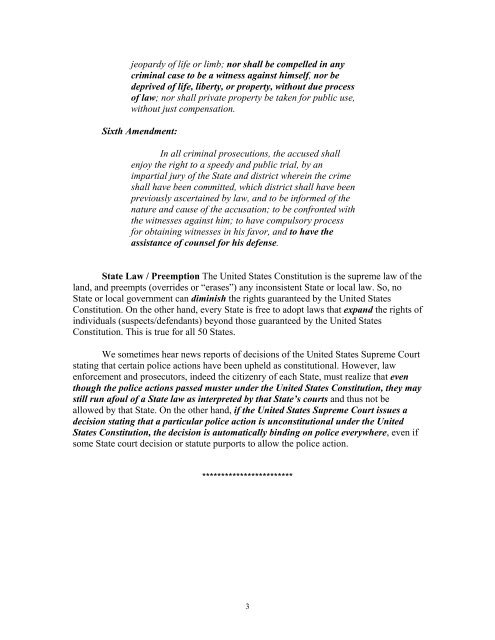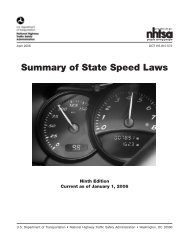The Criminal Justice System: A Guide for Law Enforcement ... - NHTSA
The Criminal Justice System: A Guide for Law Enforcement ... - NHTSA
The Criminal Justice System: A Guide for Law Enforcement ... - NHTSA
Create successful ePaper yourself
Turn your PDF publications into a flip-book with our unique Google optimized e-Paper software.
jeopardy of life or limb; nor shall be compelled in any<br />
criminal case to be a witness against himself, nor be<br />
deprived of life, liberty, or property, without due process<br />
of law; nor shall private property be taken <strong>for</strong> public use,<br />
without just compensation.<br />
Sixth Amendment:<br />
In all criminal prosecutions, the accused shall<br />
enjoy the right to a speedy and public trial, by an<br />
impartial jury of the State and district wherein the crime<br />
shall have been committed, which district shall have been<br />
previously ascertained by law, and to be in<strong>for</strong>med of the<br />
nature and cause of the accusation; to be confronted with<br />
the witnesses against him; to have compulsory process<br />
<strong>for</strong> obtaining witnesses in his favor, and to have the<br />
assistance of counsel <strong>for</strong> his defense.<br />
State <strong>Law</strong> / Preemption <strong>The</strong> United States Constitution is the supreme law of the<br />
land, and preempts (overrides or “erases”) any inconsistent State or local law. So, no<br />
State or local government can diminish the rights guaranteed by the United States<br />
Constitution. On the other hand, every State is free to adopt laws that expand the rights of<br />
individuals (suspects/defendants) beyond those guaranteed by the United States<br />
Constitution. This is true <strong>for</strong> all 50 States.<br />
We sometimes hear news reports of decisions of the United States Supreme Court<br />
stating that certain police actions have been upheld as constitutional. However, law<br />
en<strong>for</strong>cement and prosecutors, indeed the citizenry of each State, must realize that even<br />
though the police actions passed muster under the United States Constitution, they may<br />
still run afoul of a State law as interpreted by that State’s courts and thus not be<br />
allowed by that State. On the other hand, if the United States Supreme Court issues a<br />
decision stating that a particular police action is unconstitutional under the United<br />
States Constitution, the decision is automatically binding on police everywhere, even if<br />
some State court decision or statute purports to allow the police action.<br />
************************<br />
3
















